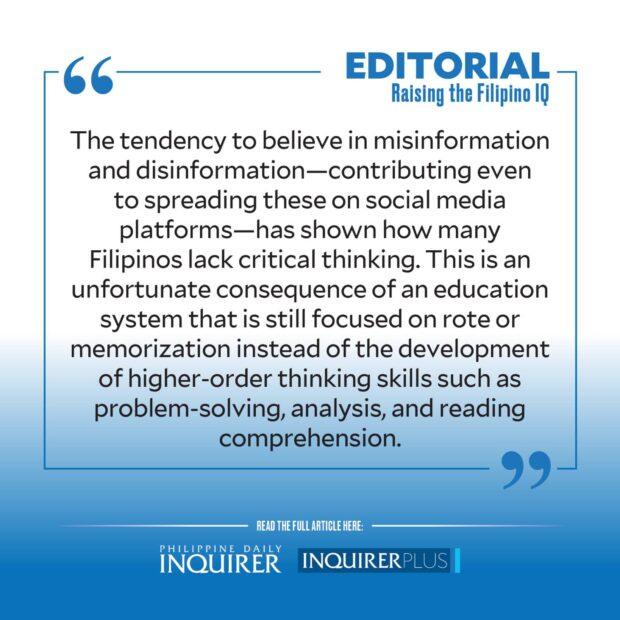Raising the Filipino IQ

The below-average IQ ranking of the Philippines in the World Population Review 2023 (WPR) is another indictment of the country’s poverty and learning crises. This may no longer come as a surprise given the dismal performance of Filipino high school students in reading, mathematics, and science literacy but it is worrisome for the country’s future in global competitiveness.
The Philippines ranked 111th out of 199 countries in the latest WPR measuring IQ scores defined as the “quality of education and resources available to people in their local geographic region.” It noted that areas with lower IQ scores were typically poorer and less developed, specifically in education. The Philippines scored 81.64, several percentage points below the average range of 85-115. Japan topped the list, while Nepal took the bottom. Among members of the Association of Southeast Asian Nations, only Laos (No. 114) and Indonesia (No. 130) ranked lower than the Philippines.
Two factors that contribute to low IQ are prenatal care and nutrition. The United Nations Population Fund reported last week that 14 percent of pregnant women in the Philippines do not get regular checkups and other necessary medical care during their pregnancy; these mothers are likely to deliver babies that are undernourished and whose growth will be stunted as they get older. Per latest data from the Department of Health, malnutrition persists among infants and toddlers with 21.6 percent of them stunted. The lack of proper nutrients in children’s diet, especially during the early critical years, hampers their mental and physical development. They are likely to face more difficulties once they reach school age and unless there are interventions, such as the government’s 4Ps and school-based feeding programs to help keep them in school, they will end up uneducated and unemployed, and likely to repeat the vicious cycle with their own children.
Culture also has a huge influence: “smart-shaming” and anti-intellectualism were prevalent in the previous administration and continue to shape mindsets today. If social media is any indication of the quality of discourse, and therefore the level of intellect prevalent in the population that has access to technology and the internet, then things do not look good.
The tendency to believe in misinformation and disinformation — contributing even to spreading these on social media platforms — has shown how many Filipinos lack critical thinking. This is an unfortunate consequence of an education system that is still focused on rote or memorization instead of the development of higher-order thinking skills such as problem-solving, analysis, and reading comprehension.
“Our education should empower us to think, to find solutions to problems, and to offer suggestions, or criticize wrongdoings,” said Dr. Lizamarie Campoamar-Olegario, an educational psychologist, in a radio interview.
Other countries have long recognized the importance of media literacy, incorporating them into their curriculum so that students as early as primary school learn how to critically consume information from social media.
The global model is Finland, which has made media literacy a core of its curriculum since 2014 and has been teaching it to preschoolers — a crucial move, especially for this generation of digital natives. The result? The Nordic country has raised a generation of thinkers that does not easily fall prey to fake news and has topped other European countries in resilience against misinformation and disinformation for five consecutive years.
The Department of Education (DepEd) has to evolve with the times. Technology and social media have irreversibly transformed how information is consumed and spread, and they have also contributed to the further decline of important life skills such as reading comprehension and critical thinking because students are spending less time on books and more time on gadgets.
If DepEd is serious about promoting education reforms, it should undertake the necessary amendments to make school curricula responsive to the demands and challenges of a more globalized world. Its plan to reduce the number of learning areas in the curriculum, and strengthen literacy and numeracy programs, must be pursued and continuously reviewed to ensure that it is at par with world standards.
Several studies have found that country-level IQ is correlated with economic and social growth. A 2006 study on human capital noted that a 1-point increase in a country’s average IQ is associated with a persistent 0.11 percent annual increase in GDP per capita.
Just like an individual, a country with a below-average IQ will not reach its full potential. It is only by addressing poverty and reforming the education system that the Philippines will be able to nurture a generation not only of critical thinkers but also problem solvers and competent professionals that will serve as the backbone of its progress and development as a nation.




















